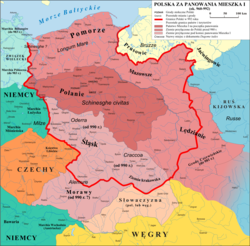
Lechites (Polish: Lechici, German: Lechiten),[1] also known as the Lechitic tribes (Polish: Plemiona lechickie, German: Lechitische Stämme), is a name given to certain West Slavic tribes who inhabited modern-day Poland and eastern Germany, and were speakers of the Lechitic languages. Distinct from the Czech–Slovak subgroup, they are the closest ancestors of ethnic Poles and of Pomeranians, Lusatians and Polabians.[2][3]
- ^ Tadeusz Lehr-Spławiński. Język polski. 1978
- ^ "Laesir is the Old Norse term for the Ljachar, a people near the Vistula in Poland". [in:] Theodore Murdock Andersson, Kari Ellen Gade Morkinskinna: The Earliest Icelandic Chronicle of the Norwegian Kings (1030–1157). ISBN 978-0-8014-3694-9 p. 471; "The word here for Poles is "Laesum" – the dative plural from a nominative plural "Laesir". This clearly is derived from the old name for Pole – "Lyakh", since in the course of the Slavonic paradigm -kh- becomes -s-in accordance with the "second palatalization" and the addition of the regular Norse plural ending of -ir- [...] [in:] The Ukrainian review. 1963. p. 70; "eastern Wends, meaning obviously the Vjatyci/Radimici, Laesir "Poles" or "Western Slavs" (ef. Old Rus'ian ljaxy) [in:] Omeljan Pritsak. Old Scandinavian sources other than the sagas. 1981. p. 300
- ^ "Vandalis, Gothis, Longobardis, Rugis et Gepidis, quos vacant aliqui Cimbros, quos hodie vocamus Pomeranos" [in:] Jan Długosz. Annales seu cronicae incliti Regni Poloniae. t. I., p. 35